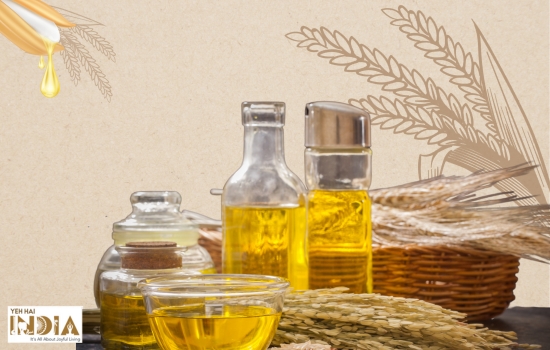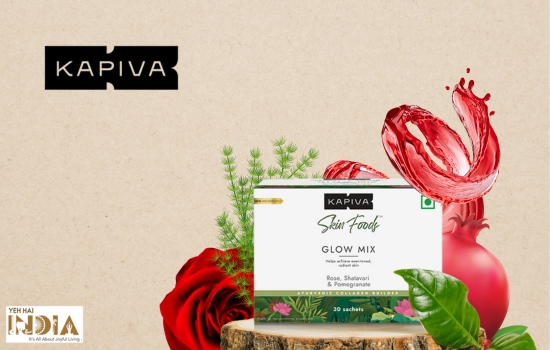Let’s look into cooking oil that creates waves in both the culinary and health worlds. Any guesses Yes! You got it right. It’s rice bran oil.
Rice bran oil, a once-doubtful cooking oil choice, is gaining popularity for its flexibility and possible health advantages.
It’s not just what you choose to cook, but everything you cook with.
In this blog article, we’ll look at the nutritional composition, health benefits, culinary uses in a variety of cuisines, and, yes, potential side effects and precautions of rice bran oil.
What is Rice Bran Oil?
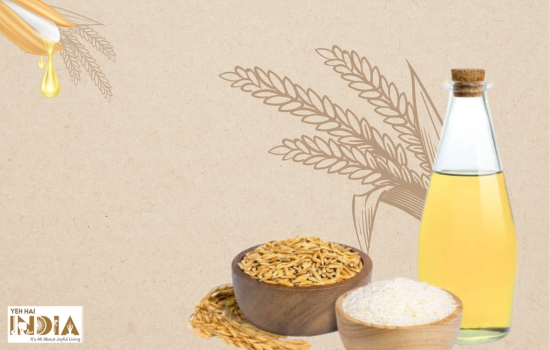
Rice bran oil is an edible vegetable oil derived from rice’s outer brown layer (bran). It’s a byproduct of rice milling that’s popular for its mild flavour, high smoke point, and potential health advantages.
This oil is widely used in cooking, particularly in Asian cuisines, because of its excellent temperature stability, making it perfect for frying and sautéing.
It is a healthy and versatile cooking oil that can be enjoyed by people of all ages.
Nutritional Profile of Rice Bran Oil
A nutritional powerhouse, including a variety of fatty acids, vitamins, and antioxidants.
- Has a high concentration of monounsaturated fats, such as oleic acid.
- A balanced polyunsaturated lipid content, comprising linoleic acid (an omega-6 fatty acid) and alpha-linolenic acid (an omega-3 fatty acid).
- Tocopherols, tocotrienols, and gamma-oryzanol, antioxidants found only in this oil, give further protection against oxidative stress and inflammation.
| Nutrient | Amount per 1 tablespoon (13.6 grams) |
|---|---|
| Calories | 120 |
| Total fat | 13.6 grams |
| Saturated fat | 2.5 grams |
| Polyunsaturated fat | 5 grams |
| Monounsaturated fat | 5 grams |
| Cholesterol, Sodium, Carbohydrates, Fibre, Sugar, Protein | 0 milligrams |
| Vitamin E | 4.39 milligrams |
| Vitamin K | 3.36 micrograms |
Source: United States Department of Agriculture (USDA) Food Composition Database.
Note: Check the nutrition label for accurate information as values depend on the brand and processing technique of the rice bran oil.
Rice Bran Oil vs Other Regular Refined Oils
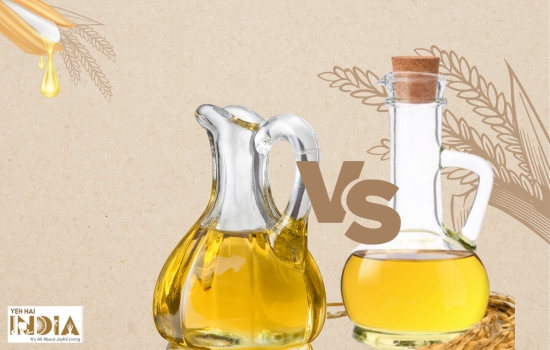
Rice bran oil frequently stands out owing to its balanced fatty acid makeup. Even though olive oil is well-known for its composition, this one has a more diverse fatty acid composition.
Fewer saturated fats than other regular oils like coconut and palm oil, making it a healthy choice for the heart. Furthermore, its higher smoke point than olive oil makes it suitable for all types of cooking.
Rice bran oil has approximately 120 calories per tablespoon, which is comparable to other typical cooking oils.
However, its distinct blend of lipids, antioxidants, and vitamins distinguishes it as a vital complement to any diet.
Benefits over other refined oils
- High smoke point, making it ideal for cooking and frying.
- A good source of vitamin E and other antioxidants.
- Relatively low in saturated fat.
- Versatile oil that can be used in a variety of dishes.
Health Benefits of Rice Bran Oil
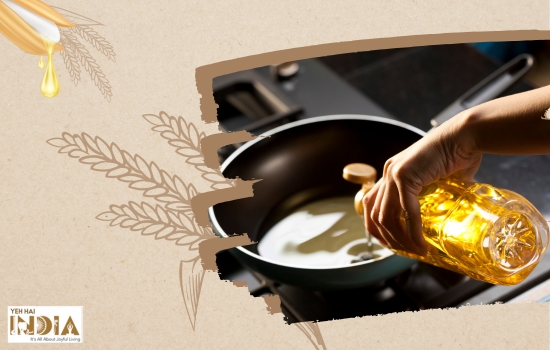
1. Heart Health
The MUFA and PUFA present in this oil can promote heart health by reducing LDL (bad) cholesterol levels and boosting HDL (good) cholesterol levels, resulting in a reduced risk of heart disease.
2. Weight Management
Tocotrienols have been associated with weight loss and obesity prevention. These chemicals may aid in the regulation of fat metabolism and the prevention of excessive weight gain.
3. Cholesterol Management
The mix of antioxidants in rice bran oil, especially gamma-oryzanol, manages cholesterol.
4. Antioxidative Properties
It helps the body fight oxidative stress and inflammation due to its high antioxidative potential. Tocopherols and tocotrienols lower the risk of chronic illnesses such as cancer.
5. Skin Health
Consumption of this oil can improve skin health, both when eaten and used topically. The high content of vitamin E provides it with moisturising and antioxidant qualities, which moisturise the skin and prevent free radical damage.
Culinary Applications of Rice Bran Oil
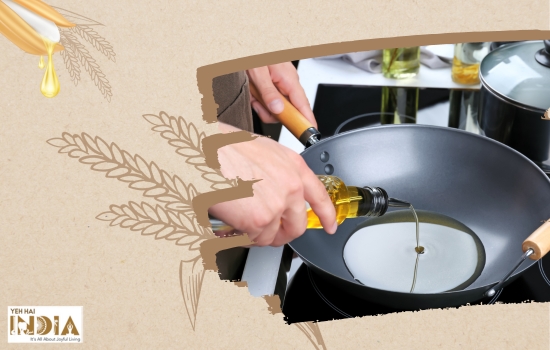
1. Cooking Versatility
- Neutral flavour
- Gentle aroma
- Suitable for a wide variety of cuisines and recipes.
- Used in both Western and Asian cookery, including stir-fries, deep-frying, baking, and salad dressings.
2. High Smoke Point
- Normally, it’s approximately 450°F (232°C) or higher, depending on the refining procedure. withstands high-temperature cooking processes without degrading or creating hazardous chemicals.
- A wonderful choice for deep-frying, pan-frying, and stir-frying
3. Baking/Roasting
- Easily substitutable for various cooking oils in baking recipes.
- Has a bland flavour that does not overshadow the flavour of baked items.
- Adds a pleasant crispiness
- Help even the distribution of heat while roasting vegetables or meats.
4. Salad Dressings
- It is comfortable to use for homemade salad dressings due to its neutral flavour.
- Does not overpower the flavours of the other salad ingredients, allowing them to shine through.
5. Sauces and Marinades
- A high smoke point prevents the marinade from burning while grilling or broiling.
- Used to prepare sauces and gravies, adding a silky texture without competing with the flavours of the food.
- It is used to flavour marinades for meats, poultry, and seafood.
Everyday Cooking Tips
- Heat the oil first, and then add your ingredients while stir-frying or sautéing to guarantee speedy frying and a delicious texture.
- To protect the quality of this oil, keep it in a cool, dark area away from direct sunlight.
- It may be used in recipes that call for a neutral-flavoured oil, such as cakes, muffins, and cookies.
Potential Side Effects of Rice Bran Oil
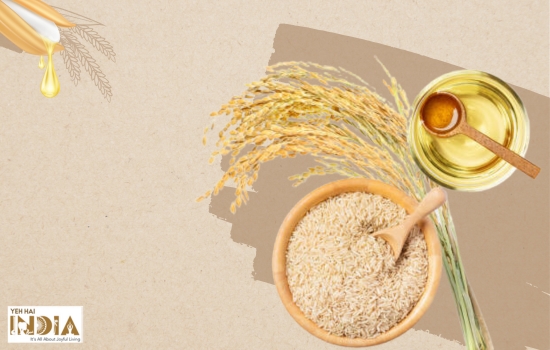
Digestive issues like bloating, gas, or diarrhoea in cases of excessive consumption
Allergies are usually uncommon, but in cases of sensitivities, itching, hives, oedema, and breathing issues might appear.
Precautions
- People who are allergic to rice or rice products should exercise caution.
- People with sensitive digestive systems should start with small doses of this oil to measure tolerance.
- Consultation with a healthcare provider or a nutritionist in cases of special dietary limitations or underlying health issues
Choosing High-Quality Rice Bran Oil
- Examine the label for an unadulterated product.
- When feasible, use cold-pressed rice bran oil to have more of the oil’s natural nutrients and flavours preserved.
- Packaging: Look for rice bran oil in dark glass bottles or metal containers. These aid in shielding the oil from light and air, which can deteriorate it over time.
- Certificates: Look for purity and quality certificates, such as USDA Organic or other trustworthy certifications.
Conclusively,
Rice bran oil is an excellent alternative for a healthy cooking oil with possible health advantages. But remember, you don’t have to consume anything because it’s trendy; instead, evaluate your requirements first before making a decision.
Do not just deviate from the trend, as we did with olive oil, but make an informed decision. Only with the proper information can you attain the potential advantages of rice bran oil in a balanced manner.
Remember, it’s all about oil at the end of the day. So, don’t overeat because fats and oils come with calories, which can lead to weight gain if not consumed cautiously. So, don’t allow ignorance and hasty judgements to overpower you, which might outweigh the potential advantages that you may attain from consuming rice bran oil.
Moderation is the key!
Recommended Article: The Wonders of Coconut Oil: Benefits, Uses and Precautions


